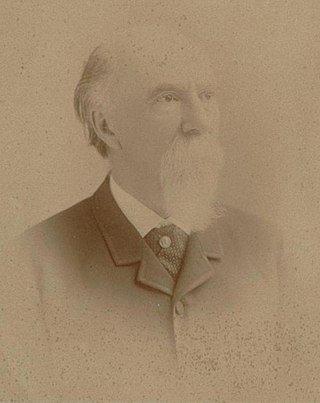
Henry Rootes Jackson was a major general in the Confederate States Army during the American Civil War.
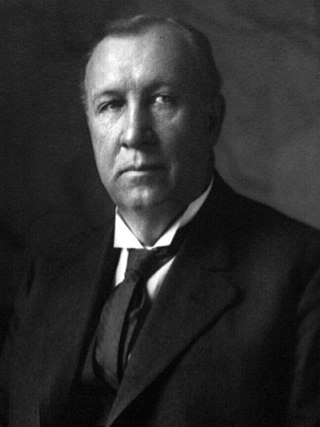
Michael Hoke Smith was an American attorney, politician, and newspaper owner who served as United States secretary of the interior (1893–1896), 58th governor of Georgia, and a United States senator (1911–1920) from Georgia. He was a leader of the progressive movement in the South and in the successful campaign to disenfranchise African American voters in 1907.
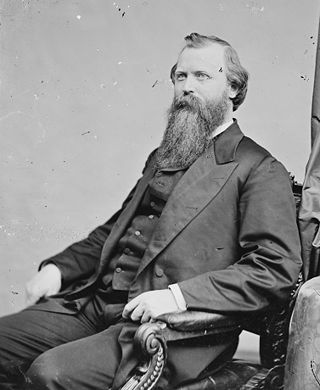
William Morris Stewart was an American lawyer and politician. In 1964, he was inducted into the Hall of Great Westerners of the National Cowboy & Western Heritage Museum.

Charles Henry Smith was an American writer and politician from the state of Georgia. He used the pen name Bill Arp for nearly 40 years. He had a national reputation as a homespun humorist during his lifetime, and at least four communities are named for him.

Nathaniel Edwin Harris was an American lawyer and politician, and the 61st Governor of Georgia.

Benjamin Jefferson Davis Jr., was an African-American lawyer and communist who was elected in 1943 to the New York City Council, representing Harlem. He faced increasing opposition from outside Harlem after the end of World War II. In 1949 he was among a number of communist leaders prosecuted for violating the Smith Act. He was convicted and sentenced to five years in prison.


Henry McNeal Turner was an American minister, politician, and the 12th elected and consecrated bishop of the African Methodist Episcopal Church (AME). After the American Civil War, he worked to establish new A.M.E. congregations among African Americans in Georgia. Born free in South Carolina, Turner had learned to read and write and became a Methodist preacher. He joined the AME Church in St. Louis, Missouri, in 1858, where he became a minister. Founded by free blacks in Philadelphia, Pennsylvania, in the early 19th century, the A.M.E. Church was the first independent black denomination in the United States. Later Turner had pastorates in Baltimore, Maryland, and Washington, DC.

George W. Ashburn was a Radical Republican US Senate candidate and judge assassinated by the Ku Klux Klan in Columbus, Georgia, for his pro-African-American actions. He was the first murder victim of the Klan in the state.

Charles Henry James Taylor (1857–1899), was an American journalist, editor, lawyer, orator, and political organizer. An early supporter of Democratic Grover Cleveland, he was appointed Minister to Liberia in Cleveland's first presidential term.

Gospel Pilgrim Cemetery was founded in 1882 as a cemetery for African Americans in the 216th general militia district, Athens, Georgia area. Nine acres in size, it contains an estimated 3,500, mostly unmarked, graves.

Henry Lincoln Johnson was an American attorney and politician from the state of Georgia. He is best remembered as one of the most prominent African-American Republicans of the first two decades of the 20th century and as a leader of the dominant black-and-tan faction of the Republican Party of Georgia. He was appointed by President William Howard Taft as Recorder of Deeds for the District of Columbia, at the time regarded as the premier political patronage position reserved for black Americans, and one of four appointees known as Taft's "Black Cabinet".
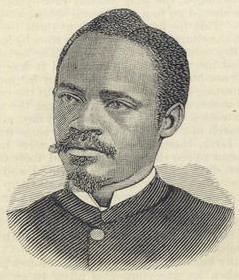
Emanuel K. Love was a minister and leader in the Baptist church from Savannah, Georgia. He was pastor of one of the largest churches in the country and was a prominent activist for black civil rights and anti-lynching laws. He played an important role in establishing separate black Baptist national organizations and advocating for black leadership of Baptist institutions, especially schools.
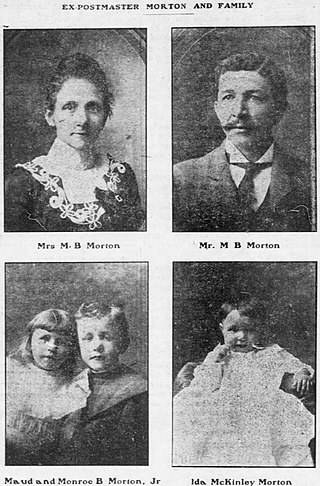
Monroe Bowers Morton, nicknamed Pink Morton was a prominent building owner, publisher, building contractor, developer, and postmaster in late 19th-century Georgia. An African American, he lived most of his life in Athens, Georgia, where he published a newspaper and built the Morton Building. The building included the Morton Theatre on its upper floors, a vaudeville venue, and offices for African-American professionals including doctors and druggists (pharmacists) on its ground floor. Occupants included Dr. Ida Mae Johnson Hiram, the first Black woman to be licensed to practice medicine (dentistry) in the state, and Dr. William H. Harris, one of the founders of the Georgia State Medical Association of Colored Physicians, Dentists and Druggists.

Henry Allen Rucker was an African American entrepreneur and politician. He was born into slavery. A good mother was credited for helping him achieve success as he was, “like steel” tempered amidst the “awful crucible of prejudice and proscription” in the American South.
Madison "Mat" Davis was a slave who became a member of the Georgia Assembly representing Clarke County, Georgia and the first African American postmaster in Athens, Georgia, after being emancipated. He was active in Republican Party politics.
Albert L. Hester was a professor of journalism at the University of Georgia (UGA), a columnist, historian, newspaper reporter, and author. He wrote more than ten books including Gospel Pilgrim Cemetery: An African-American Historical Site about the Gospel Pilgrim Cemetery for African Americans in Athens, Georgia, and Enduring Legacy: Clarke County, Georgia's Ex-Slave Legislators Madison Davis and Alfred Richardson about Madison Davis and Alfred Richardson. He wrote Athens, Georgia, Celebrating Two Hundred Years at the Millenium with his wife Conoly Hester, who is also a writer and editor. He also authored some 200 articles.
Alfred Richardson (1837?–1872) was a member of the Georgia Assembly in the U.S. State of Georgia, representing Clarke County. An African American, he entered government service after the U.S. Civil War during the Reconstruction era. Richardson faced hostility, intimidation, and physical attacks representing Clarke County. Richardson survived two shooting attacks by the Ku Klux Klan. In 1872 Richardson testified to a congressional committee that it was not safe for him to go home so he was staying in Athens, Georgia, and that many other "Colored" people had been forced to flee their farms in fear. He also spoke about being attacked and shot at at his house by men in disguise and said that he had been threatened, told of many instances of whippings, and that fellow "Colored" people were told that they should vote for Democrats or not vote at all.
The Athens Blade was a short-lived African-American weekly newspaper published in Athens, Georgia. Its early publishers were Bill Pledger and William Henry Heard.

Styles Linton Hutchins was an attorney, politician, and activist in South Carolina, Georgia, and Tennessee between 1877 and 1906. Hutchins was among the last African Americans to graduate from the University of South Carolina School of Law in the brief window during Reconstruction when the school was open to Black students and the first Black attorney admitted to practice in Georgia. He practiced law and participated in local politics in Georgia and Tennessee, served a single term (1887-1888) in the Tennessee General Assembly as one of its last Black members before an era of entrenched white supremacy that lasted until 1965, and advocated for the interests of African Americans. He called for reparations and attempted to identify or create a separate homeland for Blacks. He was a member of the defense team in the 1906 appeal on civil rights grounds by Ed Johnson of a conviction of rape, a case which reached the Supreme Court before it was halted by Johnson's murder by lynching in Chattanooga, Tennessee.
















